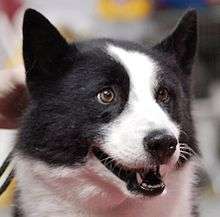Karelian Bear Dog
|
An adult Karelian Bear Dog | |||||||||||||||||||||
| Other names |
Karjalankarhukoira Karelsk Björnhund | ||||||||||||||||||||
|---|---|---|---|---|---|---|---|---|---|---|---|---|---|---|---|---|---|---|---|---|---|
| Origin | Finland | ||||||||||||||||||||
| |||||||||||||||||||||
| Domestic dog (Canis lupus familiaris) | |||||||||||||||||||||
The Karelian Bear Dog (Karjanlakarhukoira) is a Finnish or Karelian breed of dog. In its home country, it is regarded as a national treasure. Karelian Bear Dogs will hunt a variety of animals. Its quick reflexes and fearless nature have made it very popular for hunting aggressive game, including bears, moose, and wild boar. It was the breed's ability to hunt and offer protection from bears that earned the breed its name. The Karelian Bear Dog is among the top 10 most common dog breeds in Finland. [1]
History
According to archaeological records, dogs very similar to the modern Russo-European Laika and the Karelian Bear Dog have existed in northeastern Europe and Scandinavia since Neolithic times. [2] The breed standard for Karelian Bear Dogs and Laikas today calls for a black-and-white marked dog, but originally the breed included individuals with coats of wolf gray of various shades, red coats like the standard spitz, and black-and-tan specimens as well. The Karelian Bear dog has been found in Viking era graves in Denmark, Brittany, and the Isle of Man. This shows the popularity of the breed historically as a working dog. The custom was to bury the dog with their master so that they accompany them to the afterlife. [3]
The Karelian Bear Dog was used mainly for hunting small fur-bearing animals, such as squirrels and marten. Like the Norwegian Elkhound, the Karelian Bear Dog was also used in hunting moose, lynx, wolf and, as its name would suggest, hunting the Eurasian brown bear. In hunting bear, at least a pair of Bear Dogs would be used to harry the animal, barking loudly, in order to distract the bear while the human hunter came in for the kill.
Karelian Bear Dogs have been used for bear control at Yosemite and Glacier national parks, and with the Washington State Department of Fish and Wildlife.[4] Karelian Bear Dogs were introduced in 2004 in Karuizawa, Japan, a popular resort town 170 km northwest of Tokyo, where they reduced the number of bear incidents from 255 in 2006 to four in 2017.[5]
Description
Appearance
Males stand 54–60 cm (21–24 in) at the withers; females are shorter, at 49–55 cm (19–22 in). Both sexes weigh about 20–23 kg (44.1–50.7 lbs). [6]
The breed has a coat of straight, stiff guard hairs and a fine, soft, thick undercoat. There should be no curl in the hair at all. The colour should be black with white markings. Often the jet black hair is slightly tinted with brownish highlights on the ends giving it an iridescent quality. The ideal colour percentage is around 70% black and 30% white. The bushy tail curls in a circle over the back in a ring and has a white tip. It falls gently onto the dog's back or to one side. Purebred Karelian Bear Dogs have tails that curve into a circle rather than a sickle. Black speckles in the white sections of fur are considered to be a fault. [7][1][6]
Temperament

Karelian Bear Dogs are naturally aggressive towards other animals. They are very devoted to their owners, [6] but can be aggressive towards strangers. [3] Proper socialization and training is necessary due to their disposition. Karelian Bear Dogs are very territorial and will alert their handler to the presence of any strangers or other animals nearby that they do not know.
They are silent but tenacious hunters and alert their handler only when they have the prey at bay. They will keep prey cornered there by barking in a very high, fast bark and running back and forth or around the animal until their handler comes and dispatches it. Karelian Bear Dogs have been known to hold an animal at bay for a very long time. [7] If a bear tries to leave, the dog will nip at it on the backside and aggravate it to keep it from running away.
They don't always have to hunt with their master, as they can be trained to work with other people. However, they are prone to separation anxiety due to their very social nature. It is very unusual for a Karelian Bear Dog to bite a human but it may kill another animal if it feels threatened or hungry. [3]
They are very social hunting dogs that prefer an outdoor environment, and need plenty of space to run free and get lots of exercise. In addition, they need a lot of mental and physical stimulation, as this breed is used to having a job to do. These traits tend to prevent the breed from becoming popular companion dogs. [7]
Related breeds
See also
Notes
- 1 2 "Karelian Bear Dog". American Kennel Club. Retrieved 1 October 2018.
- ↑ "Karelian Bear Dog". PetGuide.com. Retrieved 1 October 2018.
- 1 2 3 "Karelian Bear Dog". Easy Pet MD. Retrieved 1 October 2018.
- ↑ Washington Department of Fish & Wildlife - KBR Program Retrieved 2012-02-25.
- ↑ The Japan Times - Bear dogs help resort town coexist with nature Retrieved 2018-06-10.
- 1 2 3 "Karelian Bear Dog". Dogtime.com. Retrieved 1 October 2018.
- 1 2 3 "Karelian Bear Dog". Dog Breed Info Center. Retrieved 1 October 2018.
External links
| Wikimedia Commons has media related to Karelian Bear Dog. |